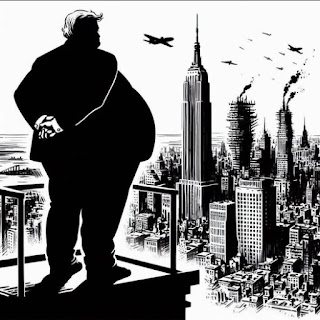The following is reproduced from a social media post. Note the original author, Robin Kers.
© Robin Kers. This is original content. Please do not repost without attribution.
1. “Listening to Albertans”—But Which Ones?
Premier Smith said Albertans feel ignored by Ottawa and deserve to be heard. Fair enough. But Alberta is home to a wide range of voices—urban and rural, Indigenous and settler, conservative and progressive, young and old. Not all share the Premier’s vision.
Oddly, the same government asking Ottawa to respect Alberta voices has often sidelined those it doesn’t agree with—from environmental advocates to school boards and Indigenous leaders.
Mini-reflection: You can’t demand recognition from the outside while denying it inside. Listening should be for all Albertans—not just the ones who already agree.
2. Turning Disagreement Into “Attacks”
Smith accused the federal government of attacking Alberta’s way of life, especially through climate policies like carbon pricing and net-zero energy mandates.
Let’s be clear: these policies are national. They apply to all provinces. And the Supreme Court has upheld Ottawa’s right to implement them. Alberta has options for tailoring its response but hasn’t always taken them.
Mini-reflection: Calling something an “attack” doesn’t make it so. It’s a strong word meant to rally people, but it doesn’t hold up under scrutiny.
3. The Four Demands—and Four Problems
Smith outlined a set of demands for Ottawa:
1. Guaranteed coastal access for Alberta’s exports
2. Cancellation of federal clean energy mandates
3. Veto power over federal tariffs
4. Elimination of equalization payments to more populous provinces
Each of these is thorny.
• Coastal access can’t be imposed on BC by Ottawa—there are legal, environmental, and Indigenous hurdles.
• The clean energy mandate isn’t just federal—it’s tied to Canada’s climate commitments, and provinces have room to negotiate implementation.
• Tariffs fall under federal trade authority. Giving Alberta a veto rewrites Canadian federalism.
• Equalization isn’t a cheque Alberta writes—it’s a redistribution formula embedded in the Constitution. Ending it would require major reform and likely broad provincial agreement.
Mini-reflection: These aren’t simple asks. They’d require major constitutional shifts, legal battles, or policy reversals with national consequences.
4. The Referendum Gambit
Smith said she won’t stand in the way of a referendum on Alberta’s future if enough citizens sign a petition. That’s a calculated message—meant to sound democratic, but with serious implications.
According to the Supreme Court’s 1998 ruling on Quebec, a referendum—even a clear majority—does not give a province the legal right to leave Canada. It would only compel negotiations involving all provinces and the federal government.
Current polling doesn’t show anywhere near majority support for separation in Alberta. And most business leaders, Indigenous groups, and moderate voters aren’t on board with going down that road.
Mini-reflection: Referendum talk can stir emotions, but it doesn’t create an exit ramp. It’s more political pressure than legal plan.
5. “Let Alberta Be Heard”—Already Is
Smith argued that Alberta is being ignored by Ottawa. But the province has significant representation in Parliament. It’s also been front and centre in national debates for years—especially on energy, climate, and federal spending.
The issue isn’t whether Alberta is being heard. It’s that it doesn’t always get its way. That’s how federalism works.
Mini-reflection: Not agreeing with someone isn’t the same as ignoring them. Disagreement is part of democracy.
Final Thought:
Premier Smith’s speech was strong in tone and clear in intent. But underneath the emotion are demands that are legally murky, politically risky, and often based on half-truths.
The question isn’t whether Alberta matters. It absolutely does. The real question is whether escalation and threats are the best way to make progress in a country built on compromise.
In anticipation of the usual accusations of bias, misinformation, or betrayal of Western values and concurrent vitriol, let me clarify the following:
This article was not written to cheer for Ottawa or to dismiss legitimate Albertan concerns. It was written because facts matter—and because responsible leadership requires more than slogans and threats.
If you think this is “federalist propaganda,” I invite you to do your own damn research. Read the Constitution. Read the Supreme Court ruling on Quebec. Read the Clean Electricity Regulations. Most of all, read the room: bluster isn’t a plan, and sabre-rattling doesn’t build pipelines or pay bills.
Constructive dialogue demands honesty, not theatre.
Sources Consulted and Cited
1. Alberta Government Newsroom
Official transcripts and policy statements from Premier Smith’s May 5, 2025, address and related legislative actions.
2. Global News
Coverage and analysis of Premier Smith’s announcement and public response to the proposed Alberta Accord and separation referendum.
Journalist: Phil Heidenreich, Global News, May 5, 2025
3. Supreme Court of Canada Reference re Secession of Quebec (1998)
Landmark ruling establishing the constitutional framework for any province seeking to secede from Canada.
Citation: [1998] 2 S.C.R. 217
4. Canada Constitution Act, 1982
Relevant sections on federal trade powers (s.91(2)), environmental authority, equalization (s.36(2)), and intergovernmental relations.
5. Bill 54 (Alberta, 2025)
Alberta’s amendment to its Referendum Act reducing the signature threshold and extending the petition period for citizen-initiated referenda.
6. Federal Clean Electricity Regulations (2023 Draft)
Environment and Climate Change Canada’s proposed regulatory pathway for a net-zero electricity grid by 2035.
7. Polling Data (Various)
Public opinion trends on Alberta separation and federal-provincial relations. Notably: Angus Reid Institute, Abacus Data, and Léger (2023–2025).



